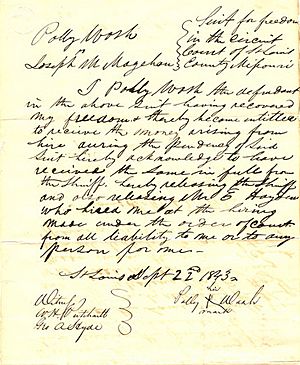Polly Berry facts for kids
Quick facts for kids
Polly Berry
|
|
|---|---|

"I, Polly Wash...having recovered my freedom..." (1843)
|
|
| Born |
Polly Beatty
|
| Other names | Based upon her slaveholder's surnames: Polly Crockett, Polly Berry, and Polly Wash |
| Occupation | Domestic servant, laundress, seamstress |
| Known for | Freedom suit Polly Wash v. Joseph M. Magehan |
| Children | Nancy Berry, Lucy A. Berry Delaney |
Polly Berry (born around 1803–1805 – died after 1865) was an African American woman who bravely fought for her freedom. She is famous for winning two important "freedom suits" in St. Louis, Missouri. She won her own freedom in 1843. Then, she won freedom for her daughter, Lucy, in 1844. Polly was also known as Polly Crockett and Polly Wash, names she got from the people who enslaved her.
Contents
Polly's Early Life
Polly was born into slavery in Kentucky around 1803 or 1805. She was first owned by the Beatty family. When she was about seven or eight years old, she was sold away from her mother to Joseph Crockett. This was a common and heartbreaking part of slavery.
In October 1817, when Polly was about 14, the Crocketts moved to Illinois. They took Polly with them. Illinois was a "free state." This meant that enslaved people who lived there for more than 90 days were supposed to be set free. While in Illinois, Polly worked as a domestic helper and spinner.
Joseph Crockett knew about the law. To avoid losing Polly, he had her taken to Missouri in April 1818. Missouri was a slave state. Polly was then sold to different owners over the next five years.
Life with the Berry and Wash Families
Around 1823, Polly was sold to Major Taylor Berry in St. Louis, Missouri. She became known as Polly Berry. She worked as a domestic servant, laundress, seamstress, and nursemaid.
After Major Berry died, Polly was owned by his wife, Fannie. When Fannie died, Polly was held by Judge Robert Wash. She was with the Berry and Wash families for about 12 or 13 years. During this time, she married another enslaved man. They had two daughters, Nancy and Lucy. Sadly, Robert Wash sold Polly's husband to someone far away in the Deep South. This separated them forever.
Fighting for Freedom
Polly was determined to get freedom for herself and her daughters. Her daughter Nancy managed to escape to Canada, where slavery was against the law.
Polly's Freedom Suit
In 1824, Missouri passed a law that allowed enslaved people to "sue for their freedom." This was called a freedom suit. Polly filed her own freedom suit in St. Louis on October 3, 1839. She argued that she should be free because she had been held illegally as a child in the free state of Illinois. Her case was called Polly Wash v. Joseph M. Magehan.
Polly also asked for money for the time she was illegally enslaved. She was hired out as a laundress during this time. Four years after she started her case, Polly Wash won her freedom! The court declared her a free woman on June 6, 1843. They gave her one dollar in damages. This decision was based on the rule "once free, always free." This meant that if a person had ever been free, they stayed free.
Lucy's Freedom Suit
Polly then fought for her daughter Lucy's freedom. She filed a suit on September 8, 1842, on behalf of Lucy. Polly argued that Lucy should be free because Lucy was born to a woman (Polly) who was legally free at the time, even though Polly was still enslaved. This was based on a legal rule that said a child's status followed their mother's.
Lucy's case was heard on February 7 and 8, 1844. A famous lawyer named Edward Bates argued for Lucy. He later became the US Attorney General under President Abraham Lincoln. Bates successfully convinced the jury that Lucy should be free. Lucy was released from jail the same day the verdict was made.
Life After Freedom
After winning their freedom, Polly lived with her daughter Lucy Ann for the rest of her life. They worked together as seamstresses. They earned a good living and were even able to travel to Canada to visit Nancy. Polly visited Nancy and her grandchildren in Toronto in 1845.
Lucy married Frederick Turner, but he sadly died in a steamboat accident. She then married Zachariah Delaney. They were married for 42 years.
Polly died after the American Civil War, which ended slavery in the United States. She never saw her husband again. However, Lucy later found her father near Vicksburg, Mississippi. Lucy, Nancy, and their father were able to reunite for a visit in St. Louis.
More than 45 years after gaining her freedom, Lucy published her memoir in 1891. It was called From the Darkness Cometh the Light, or, Struggles for Freedom. This book was the only first-person story ever written about a freedom suit.
See also
- Elizabeth Key Grinstead
- Marguerite Scypion
- Charlotte Dupuy
- Dred Scott
- List of slaves
Images for kids
-
Nancy left Niagara Falls on southwestern Lake Ontario and ultimately settled in Toronto, which is due north of Niagara Falls. She may have been assisted by one of the Underground Railroad sites in Ontario, Canada, such as the British Methodist Episcopal Church, Salem Chapel, in nearby St. Catharines
-
St. Louis Circuit Court Summons for Robert Wash in the case Polly Wash v. Joseph M. Magehan
-
Lucy A. Delaney as a grown woman, taken by 1891
 | Victor J. Glover |
 | Yvonne Cagle |
 | Jeanette Epps |
 | Bernard A. Harris Jr. |




